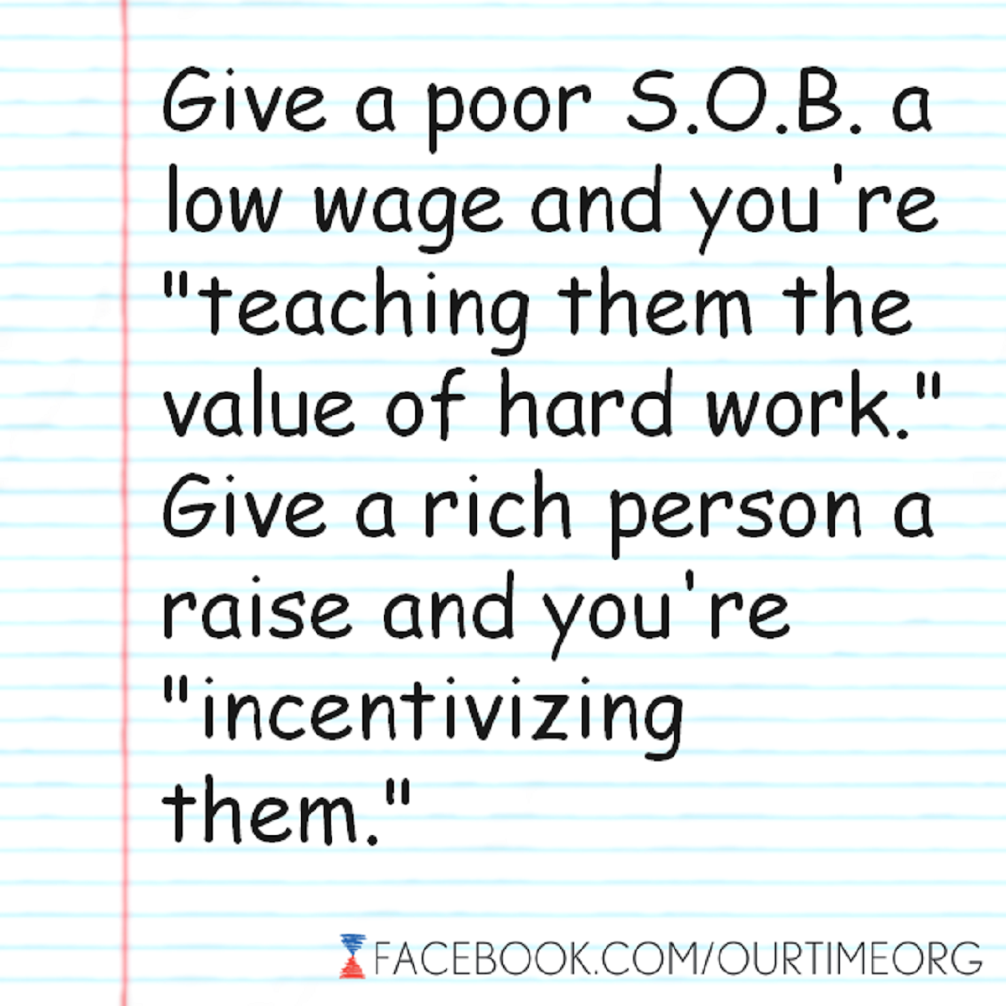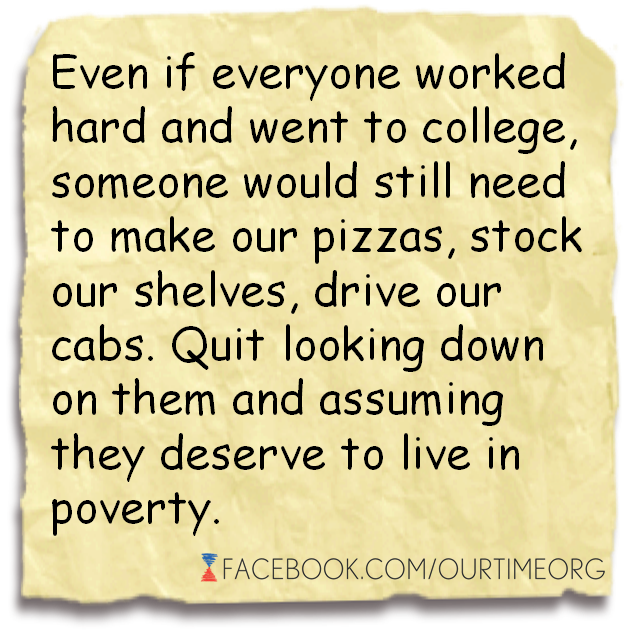If You Are Poor, Is It Because You Are Lazy?
By:
“If you work hard, if you get an education, if you’re an honest person, you can make it in America.” Bill O’Reilly was right in his now infamous exchange with Jon Stewart about the role privilege plays in shaping our economic success stories.
The American Dream can come true if you work hard, get an education, and are honest…except, when there are no jobs in your neighborhood that pay a real living wage, and you can’t afford a car so you have to commute by bus two hours a day to get to your minimum wage job, which you hate, but it’s the best you can do because you dropped out of high school, which sucked by the way, because everyone in your neighborhood is poor and, therefore, the property taxes used to fund your public school weren’t enough to afford up to date text books, much less nifty tech and gadgets or top tier teachers to keep you engaged.
None of the things that contribute to an under-educated, under-paid, under-employed American populous are “excuses” for not making your American Dream come true. But they’re very compelling “factors,” as Stewart called them, standing in the way of greater socio-economic parity in this country. As noted recently in a report by Richard Reeves and Isabel Sawhill for the Federal Reserve Bank of Boston, the idea of “meritocracy” – or advancement based on hard work and effort – is mostly a fallacy when it comes to determining one’s prospects for success. People who start off on the lower-end of the socio-economic ladder, are likely to remain perpetually behind their more affluent peers, even if their peers are less educated. The impact of privilege is generational, and while it’s a notion that has more to do with economic status and the things greater resources can afford, race, too often, tends to be a paralyzing proxy for privilege.

With privilege comes power, and with power comes influence. And privilege affects basic notions of democracy as much as it does people’s financial bottom lines. 45 million Americans (14.4% of our total population) currently live in poverty. Roughly 100 million Americans (about 30% of the American population) live at or near “the brink of poverty.” And let’s not forget about our real unemployment rate, which sits at a hefty 18%. Oh wait, were you feeling all warm and fuzzy about that 5.9% the Bureau of Labor Statistics reported at the top of the month? Sorry to disabuse you of your delusions, but that figure doesn’t count people who have taken part-time work because they couldn’t get full time jobs or those who have dropped out of the labor pool entirely, after having stopped looking for full times jobs all together.
The millions of Americans who struggle just to make ends meet are not in that position because they’re lazy or waiting on government handouts. Most often, the social paralysis caused by poverty is typically tied to low-wages, lack of educational opportunities that lead to greater economic pursuits, and student loan debt that prevents economic advancement, even when there’s a brighter path ahead. At the same time, when people are strapped for cash, over-worked and under-paid, it’s not as likely that they’re going to commit their time and resources to advocating for the policies that most impact them day to day – they’re just trying to put food on the table and make ends meet.

The picture can be pretty bleak when you consider the purse strings of so many Americans today. But the picture is even grimmer when you consider the profound impact the lack of privilege – the ability to have resources that support your educational and economic aspirations – has on the policies that shape our nation.
In the bubble that can be Washington, D.C., and in legislatures across the country, whether we’re talking about climate change and global warming, healthcare, education, finance, or technology, policies are often shaped by and for the privileged few, without real regard to broader impacts on regular people. It’s not that there is necessarily a nefarious attempt afoot to undermine the middle class and keep poor folks from rising up the social ladder. But all too often, policies are rigged by the wealthy so that they remain wealthy and keep getting more money in their pot.
Our education policy is also a failure. “No Child Left Behind” is still the law of the land, although it encourages schools to teach to the test rather than personalize learning experiences for children, making sure our kids can think and not just repeat. Likewise, the Bush Tax Cuts, which were made permanent during fiscal cliff negotiations, were painted as a boon to the middle class, but through their application to individuals and families making more than $400,000 a year, we’ve lost out on potential revenue that could help fund education and support necessary social services for those most in need.
Until we, as a people, demand and hold accountable government that is truly representative of our interests, too few will be able to reap the mass benefits that privilege plays in policymaking. We should start by supporting attempts to pass student loan refinancing, which would help make debt more manageable. Likewise, we should support legislation that would increase the minimum wage and provide real “pathways out of poverty” for those most in need of a lift toward greater economic opportunity. And, personally, while I am neither an economist nor a political leader, it strikes me that a 5-10 year moratorium on the accrual of interest rates on credit cards bearing an APR (annual percentage rate) higher than 10% would be truly beneficial for folks who leverage credit for day to day needs or to pay for college, medical expenses, or other major expenses, would go along way to helping folks put themselves on better financial footing.
To be clear, it’s not that privilege itself is a bad thing. Our hope and goal should be that one day, all Americans, regardless of their race, ethnicity, gender, geographic situation, or socio-economic status, have the privilege of pursuing their American Dream. But until policies are framed in such a way that they genuinely consider disparate impacts on the low-income and underserved members of our population, and unless they acknowledge that in certain instances, we must act affirmatively to right the wrongs that have historically disenfranchised entire groups of people, then the policies shaping this great nation will continue to benefit only a privileged few, while the rest of us hold strong to our American Dreams deferred.
